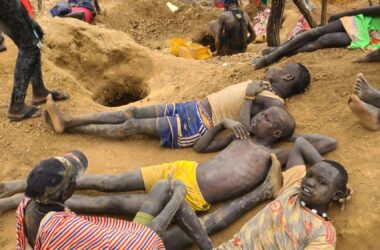By Kei Emmanuel Duku
South Sudan Red Cross has reported that 199 people have succumbed to cholera, and another 13,206 suspected cases have been identified across the country as of December 29, 2024.
Renk and Malakal in Upper Nile State, Juba in Central Equatoria State, and Bentiu in Unity State are among the areas where suspected cases have been reported since the outbreak was confirmed.
The South Sudan Red Cross states that it has already reached more than 40,000 people across the country. However, with the influx of Sudanese refugees fleeing armed conflict and the exacerbation of poor sanitation due to flooding, cases are expected to surge in the coming days.
The organization further noted that, in collaboration with the State Ministry of Health and other health partners, it has already established nine Oral Rehydration Points in Renk town to minimize the spread of the virus.
Achuil Manyuat, South Sudan Red Cross Emergency Operations Manager, stated that more than 300 volunteers have been trained and are conducting Risk Communication and Community Engagement activities in areas affected by cholera outbreaks to help prevent and control further spread of the virus.
Meanwhile, Daniel Mutinda, International Federation of Red Cross and Red Crescent Societies (IFRC) DM Delegate, emphasized the importance of collaboration with partners like the SSRC to enhance response plans and reduce the spread of cholera amidst the increasing number of cases across the country.
“We are deeply concerned by the rapid rise in the number of cases across the country. We are leveraging our unparalleled reach, resources, and community trust to mount a strong response,” said Mutinda.
Celine Leonet, the International Committee of the Red Cross (ICRC) Head of Programs and Prevention, highlighted the urgent need to implement response and mitigation plans in hard-to-reach areas affected by conflict and in detention facilities across various parts of the country.
Currently, the South Sudan Red Cross is actively raising awareness about the outbreaks in schools, homes, and public gatherings with the support of traditional leaders. Communities have also been advised on safety measures for handling dead bodies using safety and dignity kits.
The organization stated that the nine Oral Rehydration Points will provide oral rehydration solutions to individuals suspected of exhibiting cholera symptoms before referring them to Cholera Treatment Centers (CTCs).
It further noted that access to safe drinking water and improved sanitation facilities in cholera hotspots will be crucial in mitigating some of the triggers of the epidemic.
It is estimated that approximately 500,000 vulnerable people are affected by floods and the cholera outbreak across the country. This necessitates over CHF 9 million in Food Response funds to support life-saving operations in the country.




